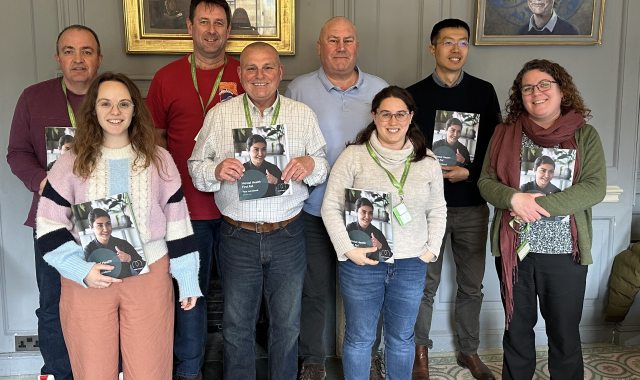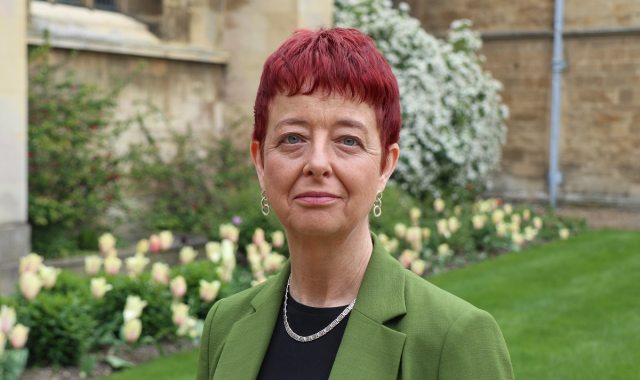Universe unravelled: researchers at the Stephen Hawking Centre, including Caian Amelia Drew, explain cosmology in new Discovery documentary
- 17 November 2020
- 4 minutes
The Stephen Hawking Centre for Theoretical Cosmology has teamed up with Discovery on a documentary series exploring new windows on our Universe.
The documentary series Universe Unravelled is available on Discovery+, a digital streaming platform now available in the UK. The series is aimed at anyone who is curious about the Universe we live in, with no previous knowledge of cosmology required. Across more than 20 short episodes, the series explores what we already know about the Universe, what cosmologists and relativists are working on right now, and where new observations may lead in the future.
The programme is inspired by the late Stephen Hawking’s ground-breaking work on cosmology, black holes and gravitational waves, most of which was done during his time as a Fellow of Gonville & Caius College, and features researchers from the Hawking Centre for Theoretical Cosmology (CTC) and the Kavli Institute for Cosmology at the University of Cambridge.
The series explores the big questions in contemporary research, which are being driven by new observations, such as the recent discovery of gravitational waves. It starts with Einstein’s general theory of relativity, describing how massive objects warp the fabric of spacetime and how they can collapse under their own gravity to form black holes. It explores how these black holes can send gravitational waves rippling across spacetime, and what happens if you were to fall into a black hole.
Viewers can definitely expect to come away with a deeper understanding of the Universe, including very recent developments in the fields of cosmology and gravitational waves.
- Amelia Drew, former Caius PhD Student in Theoretical Physics (2012)
The series also describes the violent explosion that marked the beginning of our Universe, and how the Universe expanded from this initial Big Bang, forming all the structures we observe today – galaxies, stars and planets. It then probes the mysteries that still puzzle cosmologists, such as dark energy and dark matter. The series ends with a future outlook of what we might expect to learn from ambitious new observational programmes. All the basic concepts underlying are presented in an easily accessible manner, and it features stunning graphics, some produced in collaboration with Intel’s Advanced Visualization team.
The series features CTC and Kavli researchers explaining these remarkable concepts. It offers a glimpse of what it’s like to work at the cutting edge of cosmology: confronting sophisticated mathematics with observational data, employing some of the world’s fastest supercomputers, and even daring to challenge Einstein's highly successful theory in an attempt to explain what has so far defied explanation. Viewers not only learn about the deepest secrets of our Universe, but also find out about the everyday life of students and staff at a world-leading research centre.
Amelia Drew, a former Caius PhD Student in Theoretical Physics (2012) who has started as a Junior Research Fellow in Theoretical Physics at Homerton College, features in the documentary. “Filming with Discovery provided a great opportunity to engage with a young adult audience on the topics of gravity and cosmology, including my research into cosmic strings. Viewers can definitely expect to come away with a deeper understanding of the Universe, including very recent developments in the fields of cosmology and gravitational waves.”
The collaboration between Discovery and the CTC started in 2010. A highlight was Discovery live-streaming Stephen Hawking's 75th birthday symposium which was a huge success watched by millions, especially among younger members of their audience.
The series was filmed at the Centre for Mathematical Sciences and the Institute of Astronomy and produced with the help of science editors from Plus magazine, part of the University’s Millennium Mathematics Project outreach programme.
The CTC team worked closely with Navada Studios, who were responsible for the video production, with editorial oversight from Discovery producers. Funding for the project was provided by the Kavli Foundation, an organisation dedicated to advancing science for the benefit of humanity, promoting public understanding of scientific research, and supporting scientists and their work.
“We are grateful to Discovery and the Kavli Foundation for supporting this unique opportunity to continue Stephen Hawking’s vision of reaching out, especially to younger audiences, to inspire curiosity about our Universe and the huge progress currently being made to unveil its secrets,” said Paul Shellard, CTC Director. “This was a remarkable collaboration in which we were able to work closely with the production team, ensuring both viewer interest and scientific accuracy, which we hope provides a great model for future science outreach.”
“Stephen Hawking’s work was undoubtedly a significant influence behind my decision to pursue research into theoretical cosmology. He was a frequent presence around College at dinners, May Balls and other events, even attending a College music society concert in which I performed as an undergraduate. All of these experiences made it very exciting to be able to join his research group as a PhD student,” said Amelia of her encounters with Professor Stephen Hawking at Caius.
The series is available on the new Discovery+ service that can be found at discoveryplus.co.uk, together with a short trailer. To find out more about the Hawking Centre, visit ctc.cam.ac.uk.
This article was adapted from a version on the University of Cambridge website.
Image credit (Universe Unravelled): Discovery+


